Madeleine L’Engle
#22 on the 100 Most Frequently Challenged Books of 1990-2000
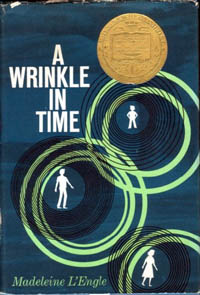
A Wrinkle in Time |
What I believe is so magnificent, so glorious, that it is beyond finite comprehension. To believe that the universe was created by a purposeful, benign Creator is one thing. To believe that this Creator took on human vesture, accepted death and mortality, was tempted, betrayed, broken, and all for love of us, defies reason. It is so wild that it terrifies some Christians who try to dogmatize their fear by lashing out at other Christians, because tidy Christianity with all answers given is easier than one which reaches out to the wild wonder of God’s love, a love we don’t even have to earn.
– Madeleine L’Engle
Madeleine L’Engle passed away earlier this month.
Banned Books Week is the brainchild of the American Library Association
Mark Twain
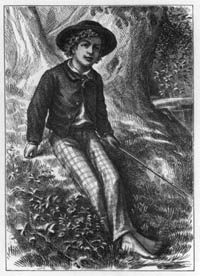 The Adventures of Tom Sawyer |
#84 on the 100 Most Frequently Challenged Books of 1990-2000
“The Committee of the Public Library of Concord, Mass, have given us a rattling tip-top puff which will go into every paper in the country. They have expelled Huck from their library as ‘trash and suitable only for the slums.’ That will sell 25,000 copies for us sure.”
– Mark Twain
Angela Gunn at USA Today’s Tech_Space blog has a great entry for Banned Books Week And Tango Makes Three, a children’s book about the two homosexual penguins, Silo and Roy, who currently reside at the Central Park Zoo.
Where’s Waldo? by Martin Hanford
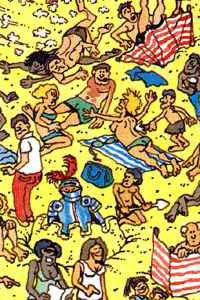
Where’s Waldo |
#88 on the 100 Most Frequently Challenged Books of 1990-2000
An amazon.com book reviewer, Mr. Sir, wrote: I have looked into it, and it appears that the reason “Where’s Waldo” got banned was because it features adult material such as “topless sunbathers,” and other adult “hidden pictures.”
This does make me consider what else might be hidden in the complex world of Waldo. I’m wondering if I’ll find pictures of Waldo eating guinea pigs or engaging in cannibalism. What if there are pictures of Waldo flashing the “hail satan” hand sign? Could Waldo be gay? Not that there’s anything wrong with that, but it could explain the fury of the book banners. Rumors abound that Waldo was seen in one picture hanging out with Tinky Winky the Teletubby. The horror, the horror!
– Raleigh Muns.
Although thought an urban legend, this was true.
Because, in the Western world, breasts are for sex, not for nourishing babies.
Margaret Atwood
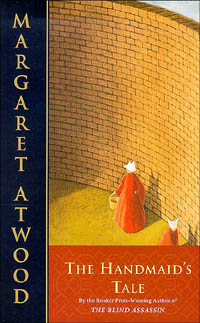 The Handmaid’s Tale |
#37 on the 100 Most Frequently Challenged Books of 1990-2000
A voice is a human gift; it
should be cherished and used,
to utter fully human speech as
possible. Powerlessness and
silence go together.– Margaret Atwood
George Orwell
Although not in the top 100. Ninteen Eight-Four was a banned book, as was Animal Farm in Soviet Russia.
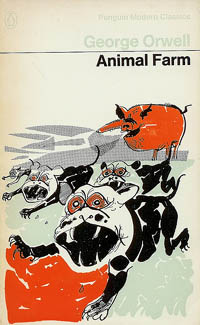 Animal Farm |
In our time, political speech and writing are largely the defense of the indefensible. Things like the continuance of British rule in India, the Russian purges and deportations, the dropping of the atom bombs on Japan, can indeed be defended, but only by arguments which are too brutal for most people to face, and which do not square with the professed aims of the political parties. Thus political language has to consist largely of euphemism., question-begging and sheer cloudy vagueness. Defenseless villages are bombarded from the air, the inhabitants driven out into the countryside, the cattle machine-gunned, the huts set on fire with incendiary bullets: this is called pacification. Millions of peasants are robbed of their farms and sent trudging along the roads with no more than they can carry: this is called transfer of population or rectification of frontiers. People are imprisoned for years without trial, or shot in the back of the neck or sent to die of scurvy in Arctic lumber camps: this is called elimination of unreliable elements. Such phraseology is needed if one wants to name things without calling up mental pictures of them. Consider for instance some comfortable English professor defending Russian totalitarianism. He cannot say outright, “I believe in killing off your opponents when you can get good results by doing so.” Probably, therefore, he will say something like this:
“While freely conceding that the Soviet regime exhibits certain features which the humanitarian may be inclined to deplore, we must, I think, agree that a certain curtailment of the right to political opposition is an unavoidable concomitant of transitional periods, and that the rigors which the Russian people have been called upon to undergo have been amply justified in the sphere of concrete achievement.”
The inflated style itself is a kind of euphemism. A mass of Latin words falls upon the facts like soft snow, blurring the outline and covering up all the details. The great enemy of clear language is insincerity. When there is a gap between one’s real and one’s declared aims, one turns as it were instinctively to long words and exhausted idioms, like a cuttlefish spurting out ink. In our age there is no such thing as “keeping out of politics.” All issues are political issues, and politics itself is a mass of lies, evasions, folly, hatred, and schizophrenia. When the general atmosphere is bad, language must suffer.
– George Orwell, Politics and the English Language, 1946.
J.K. Rowling
#7 on the 100 Most Frequently Challenged Books of 1990-2000.

Harry Potter |
Once again, the Harry Potter books feature on this year’s list of most-banned books. As this puts me in the company of Harper Lee, Mark Twain, J. D. Salinger, William Golding, John Steinbeck and other writers I revere, I have always taken my annual inclusion on the list as a great honour. “Every burned book enlightens the world.” – Ralph Waldo Emerson
– J.K.Rowling
Judy Blume, author of the challenged book Forever (#8 on the list), has some thoughts on the challenges to Harry Potter.
Slaughterhouse-Five
#69 (w00t!) on the 100 Most Frequently Challenged Books of 1990-2000
 Kurt Vonnegut |
While on the subject of burning books, I want to congratulate librarians, not famous for their physical strength, who, all over this country, have staunchly resisted anti-democratic bullies who have tried to remove certain books from their shelves, and destroyed records rather than have to reveal to thought police the names of persons who have checked out those titles. So the America I loved still exists, if not in the White House, the Supreme Court, the Senate, the House of Representatives, or the media. The America I loved still exists at the front desks of our public libraries.
– Kurt Vonnegut, Man Without a Country
Angela Gunn at USA Today’s Tech_Space blog also covered Vonnegut this week.
Comments
One response to “Banned Books Week 2007”